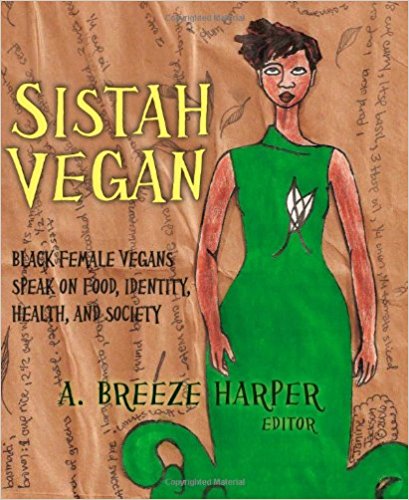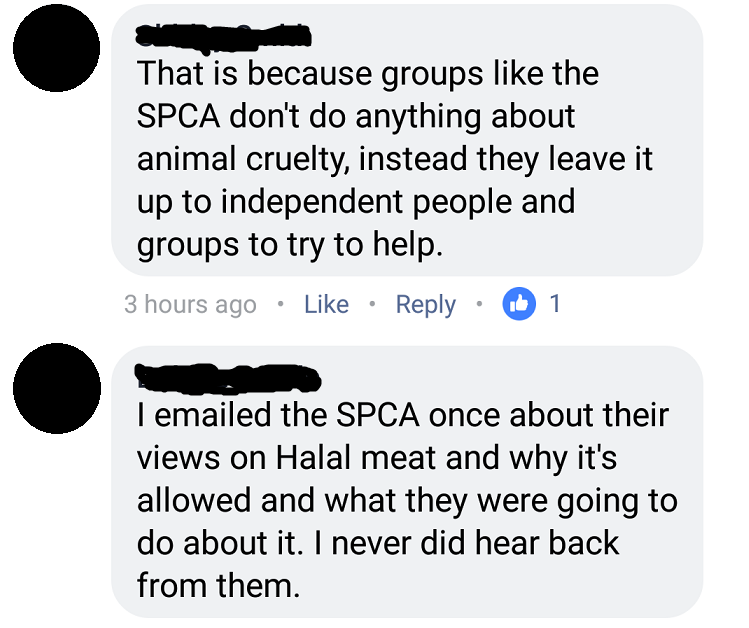(Image is from Wishing Well Sanctuary)
I finished Sistah Vegan this month and decided it was worth its own post so here are my very inexpert thoughts on intersectional veganism and the book that compiles some essays dealing with the topic.

**Disclaimer: am white person whiting it up over here.
Prologue: The Uncomfortable Reality of Racism in Animal Rights
Here are a couple of comments I stumbled upon recently, in response to an animal advocacy group sharing an article that said Canada was badly ranked for it’s treatment of animals (unsurprising).

The first comment is frustratingly ignorant. The SPCA can only do so much, guys, because the laws suck and need to be updated. Pay attention to who you’re voting for. The laws also require law enforcement officers who are actually interested in enforcing the laws in order to be effective. Pay attention to who isn’t doing the enforcing and give them hassle when they fail to act. Don’t break into people’s houses and steal animals and ruin animal cruelty cases that the SPCA are building up legally. Come on, now.
The second comment is, you know, racist.
It’s ignorant, too, because, really. What is the SPCA supposed to do about an industry practice that is entirely legal and defined as “not animal cruelty” and instead one of the acceptable methods of slaughter?
I should expand on the “racist” thing though because I happen to know some people IRL who would take issue with that label, annoyingly. “It can’t be racist if it’s about a religion” OK Brent, best case scenario you’re a bigot, congrats, but I’m still going to call it racism because Islamaphobia gets directed at anyone who looks vaguely brown.
Why is it a problem that people are against Halal? Well – it’s not. Halal is not a great thing where animals are concerned. It requires animals being slaughtered for food to be alert during slaughter whereas otherwise the animal would be stunned first. Personally I think it’s not the biggest difference because animals slaughtered for food tend to be at least somewhat aware of what they’re heading for before they get stunned, especially if the slaughterhouse is badly designed or not following the top guidelines, but it makes enough of a difference to the individual animals that really that sort of practice shouldn’t be allowed.
But why single out Halal? Kosher is exactly the same. Also, why single out either Halal or Kosher? Why not single out the industry standard practice of grinding up male chicks while they’re still alert? That is not done because of religious laws, just for, I don’t know, expedience, maybe. Or what about gestation crates for pig mothers, which is a practice that causes immense suffering for years on end rather than for just a split second at slaughter? How about going after gigantic quotas that lead to massive stress among the already stressed-out workers, which of course leads to physical abuse of the animals, either as a necessity for reaching quota or as an outlet for frustration?
How I deal with Halal and Kosher is that I’ve just resigned myself to being mostly silent about it, because there are, in fact, animal advocates of both the Muslim and Jewish persuasions who are having these conversations within their own communities and it isn’t my place as some rando Catholic to butt in. Why not allow them to take care of their own cultural practices, particularly these days, when their communities are under quite a bit of stress because of certain unmentionable somehow elected officials? Really, ever since September 11, 2001, it hasn’t been the opportune moment to start browbeating Muslim people about one of their cultural practices that isn’t good for animals. Especially when non-Muslim Canadians aren’t exactly lining up to tidy up our own garbage practices.
Canada has plenty of animal rights issues to tackle that are not specific to our Muslim communities. Like the seal hunt. Like all of those other meat industry standard practices I mentioned. How about the transportation of pigs for slaughter? That was kind of a big deal a while ago.
Also, Islam is in many ways a pretty animal-friendly religion. Sure, Halal requires animals to be alert for slaughter and there are the sacrificial animals during Eid, but Muslims are technically not supposed to eat pork ever (good for pigs), and a lot of their fasting rituals require them to abstain from meat for lengthy time periods each year (good for food animals in general). Christianity could learn a thing or two.
I don’t know this commenter and for all I know “Halal” was just the first thing that popped into their head when it occurred to them to email the SPCA. But probably not. I think it’s more than safe to say that this is an example of someone who probably does care about animals, but who also is upset about Muslim people existing nearby and has decided to kill two birds with one stone and join the two pet causes.
I’m ashamed to say I didn’t speak up here. I seriously considered it. I think things like this hurt everyone, because first of all, it’s racist, which is never good, and then there’s the fact that there easily could be a Muslim person scrolling through these comments, and animal rights needs allies, and to have allies we need to make people feel welcome, and not make them feel like they do anywhere people enthusiastically voted for Stephen Harper and his low key Islamaphobia. Finally, it does delegitimize us a bit. People are looking for any excuse to dismiss animal rights as a thing worth discussing, and if you’re using it as a platform to be racist, you’ve basically handed them a perfect reason to stop listening forever.
The reason I didn’t speak up is sort of complicated. The first problem is that Facebook will then plaster that conversation on the walls of my friends, some of whom are my coworkers, and I didn’t want them to see me calling a stranger an Islamaphobe. And that’s basically what it would have been, because the second problem was that I couldn’t come up with anything calm and reasonable to say.
I still think the right thing to do was to think about it for a while and then post something along the lines of, “Hi there – Islam is a pretty animal-friendly religion, actually, considering the fasting and such, and there are lots of other, non-Islamic and totally legal industry practices that cause a lot of suffering to food animals, none of which the SPCA is capable of ending on its own. We need to vote smarter and put pressure on our elected officials so that they know we want animal welfare improvements. Have a LOVELY non-Muslim-hating day!”
Alas. Next time.
And that said…
The Actual Review
The book is a collection of personal essays about the broad experience of black women vegans. A lot of the essays focus on health veganism. Health veganism is cool and all but for my part, I’m not really interested in hearing about the health benefits of being vegan these days. What I actually want to hear about are the pitfalls. I’d like in depth examinations of B12 deficiencies and where to get calcium, vitamin A, omega 3s, iron, and zinc, because although I do have vague ideas about all of those things, being nutritious is really tricky and I think it can only help to be honest about how complex it is. My sister has talked about some of that before but I’d like to see more of that from vegans regularly because it’s helpful stuff. (HERE’S THE PART WHERE I UNSUBTLY SHOUT OUT TO THREE TO WRITE MORE NUTRITION STUFF.)
Health veganism, from the perspective of all of the essayists is especially beneficial for black Americans, however, and that’s where my own perspective is limited. I may not be all that excited about how useful a vegan diet can be for combating obesity, heart disease, and diabetes, but because black Americans are disproportionately more likely to die from these health problems than other races in America, it’s clearly worth more discussion.
There was also a really intriguing conversation near the end of the book between women discussing being fat, black, and vegan/vegetarian, and that was one of my favourite parts. Fellow vegans: FAT SHAMING. IS NEVER. OK. FAT SHAMING. ONLY. DOES HARM. THANKS.
Perhaps my favourite essay was “Being a Sistah at PETA” because I’m a PETA apologist. I love PETA criticism and here was some really well thought out criticism written by a former employee. She says she wanted to apply the intersectional message of a vegan diet being good for black Americans’ health considering they are more likely to face certain health problems made worse by animal consumption, but PETA wanted to focus on fur-wearing in hip hop and getting various black celebrities to be publicly anti-fur. It seems clear from this essay that their goals were really short-sighted and, like, extremely white. Outreach to any community that focuses on “what animal rights can do for you” would probably be more effective in the long run than patronizing “let’s get celebrity role models to say stuff for us and that’ll do it.” Sigh, PETA. While you may like your bad publicity and your celebrity partnerships, sometimes maybe try reaching out in a thoughtful manner. Cover your bases, is all I’m suggesting.
Finally, we arrive at “the dreaded comparison.” The biggest takeaway I got from this collection was that it’s really, really important to be thoughtful about rhetoric. Comparing animal exploitation to human atrocities is important, and probably essential, both for understanding how animal exploitation works AND for understanding how human exploitation works, but, especially if we’re white, we need to think carefully about when and why we’re doing it. Mainly, we need to not scream all day about how the meat industry is just like slavery or the Holocaust, because in doing so we may be hurting marginalized people. There are several accounts of hearing black people say they were viscerally disgusted by “meat is like slavery” rhetoric and never gave the issue more careful thought afterwards. If someone has observed throughout our culture that animals are worth far less consideration than humans, and also that their own humanity will always be up for debate because of systemic white supremacy, this sort of rhetoric will never help animals, and instead will always hurt people. If we’re doing comparison, it needs to be in specific contexts only, thoughtful, studious ones, looking at the similarities and differences between human and animal exploitation. We can still ask people to begin to value animals more and to consider their suffering when they make decisions, and we can absolutely use strong rhetoric to do so, but I think white animal rights activists especially need to take several steps back if we’re going to use human atrocities that didn’t affect our ancestors and don’t affect us currently as easy rhetorical devices, and, like, not do that.
Sistah Vegan is good reading for anyone who wants to help make the animal rights community less racist and therefore much, much better. We need to be accommodating and intersectional. It’s the only way forward.



